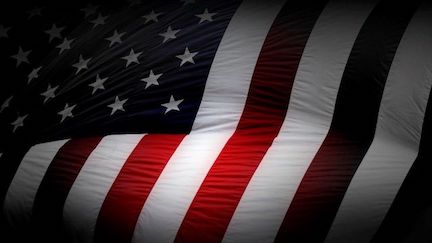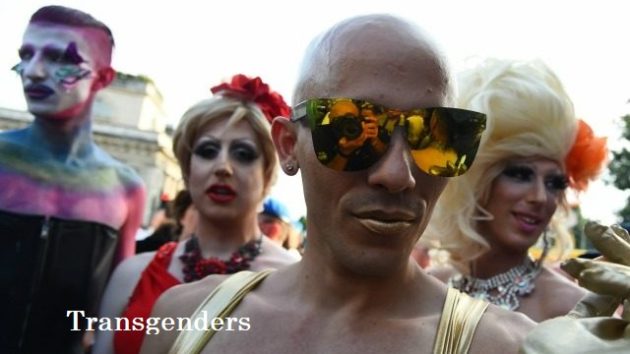The Oddity of the LGBT Alliance
David Carlin: Why are homosexuals so intimately connected with transgenders? Because both embrace the anti-nature movement.
There is something puzzling about the LGBT (lesbian-gay-bisexual-transgender) alliance: Why is T connected so intimately with LGB? Why do LGB people rage against injustice when T people are not allowed to use the bathroom of their choice or are not allowed to serve in the military?
It is easy to understand why people belonging to one category of homosexual persons (gays or lesbians or bisexuals) would get upset when discrimination is directed at another category of homosexual persons. After all, all three are in the same homosexual boat – even though bisexuals sometimes prefer to travel in the heterosexual boat.
But a transgender person isn’t homosexual, at least not necessarily so; and, at all events, it is not his/her sexual orientation that qualifies him/her as transgender. So why should a homosexual person feel personally offended when a transgender person is banned from certain bathrooms and showers or is kicked out of the army or navy?
Why do LGB people feel so close to T people? Is their alliance simply a matter of political convenience, the way LGB people have political alliances with Black Lives Matter or feminists or environmentalists or gun control advocates?
No, it is much closer than that. The trans person is felt to be one of their own. But why?
If the sexual revolution, of which the gay rights movement has been a major part, has been the great anti-Christianity movement of the last half-century or so (and it has been), there is another great anti-Christianity movement that has also been taking place. This second movement is an anti-nature movement, a movement that promotes the idea that things that have been considered unnatural from time immemorial should now be thought of as quite unobjectionable.

For some time now these rejections of nature have been celebrated, or at least condoned, on TV, in movies, in classrooms, in legislative chambers, and in law courts. What in particular?
-
Homosexuality. It used to be called “the unnatural vice.” Now, according to the masters of our popular culture, it is a perfectly respectable form of love.
-
Child abandonment. It used to be thought that only an unnatural parent would abandon his/her children, the parent-child bond being the most fundamental of all human connections. But for decades now American society has allowed fathers (though not yet mothers) to beget children and then walk out on them.
-
Bodily mutilation. If you spend a lot of time among young people (as I myself do in my capacity as a community college professor), you will observe the relatively new fashion of making nickel-or-quarter-size holes in ear lobes or cheeks or elsewhere. That’s minor-league mutilation. More advanced advocates of mutilation (I have not, thank God, come across any of these at my college) go further, defending the amputation of fingers, hands, and limbs – either as a way of being “different” or as a way of maintaining solidarity with disabled (differently abled) persons.
-
Suicide. It used to be that suicide was thought of as the most unnatural thing in the world. What could be more unnatural than to renounce life itself, the most fundamental of all natural goods? But now suicide or voluntary euthanasia is considered by truly “progressive” people to be a fine thing. To be sure, they don’t consider all suicide to be good. It is good that suicide or euthanasia should be chosen by very old people who are now (allegedly) incapable of getting any significant enjoyment out of life; or by terminally ill people who wish to shorten life by a few weeks or a few months; or by people whose life involves severe physical or mental suffering; or by mature (but not necessarily old) people who now find life boring. But it is not good (not yet, but stay tuned) if a 17-year-old girl commits suicide because her boyfriend dropped her.
-
Transgenderism. In the other cases listed, nature gives us strong hints as to the correct way to proceed – e.g., “have sex with persons of the opposite sex only,” “don’t abandon your children,” “don’t mutilate your body,” and “don’t kill yourself.” But in the case of sexual/gender identity, what nature gives us is something more than a hint. It used to be thought that the question of whether a newborn is a boy or a girl could be answered by taking a quick glance at the baby’s genitalia. Now we are told that the question shouldn’t be answered by other persons (doctors, nurses, mothers, fathers) who “assign” a gender to the child.

No, it should be answered by the child itself when it grows old enough to make up its own mind. In the old days, the doctor would say to the new mother, “Congratulations, it’s a boy” or “Congratulations, it’s a girl.” Nowadays a truly up-to-date doctor will say, “Congratulations, it’s a human baby of some sort – but of course we won’t really know till the child gets older and can decide for itself.”
It used to be thought that nature was the creation of God and that God, speaking through nature, gave us certain very strong hints as to how we should behave (these hints were often called “natural law”). By rejecting these hints, which is what popular philosophy is now doing, we are rejecting nature; and by rejecting nature we are rejecting God.
So if you wonder: why is the pro-gay movement so intimately connected with the transgender movement? The answer: Because they are both parts of the anti-nature movement.
This allows us to appreciate how especially dangerous to Catholicism the pro-gay movement is. It lies at the intersection of the sexual revolution and the anti-nature movement. As part of the sexual revolution, it is anti-Christianity. And as part of the anti-nature movement, it is anti-God. It is, therefore, a double threat to Catholicism.
Yet some Catholics believe we need to “build a bridge” to this movement.
![]()
David Carlin
David Carlin is professor of sociology and philosophy at the Community College of Rhode Island, and the author of The Decline and Fall of the Catholic Church in America.
EDITORS NOTE: © 2017 The Catholic Thing. All rights reserved. For reprint rights, write to: info@frinstitute.org. The Catholic Thing is a forum for intelligent Catholic commentary. Opinions expressed by writers are solely their own.



Trackbacks & Pingbacks
[…] David Carlin, professor of sociology and philosophy at the Community College of Rhode Island, in a column titled “The Oddity of the LGBT Alliance” writes: […]
Leave a Reply
Want to join the discussion?Feel free to contribute!